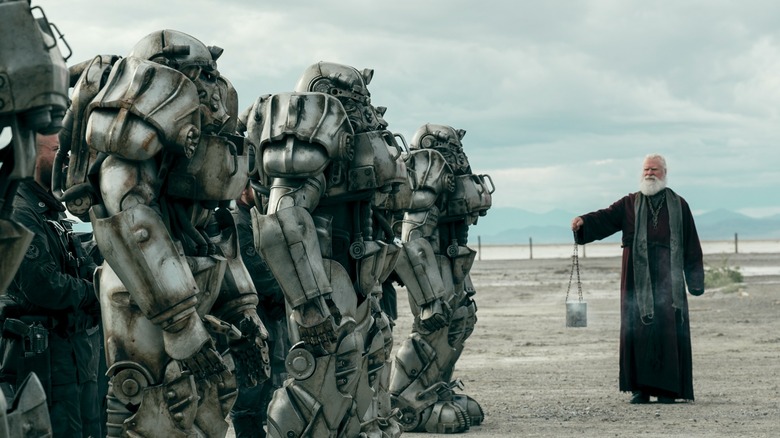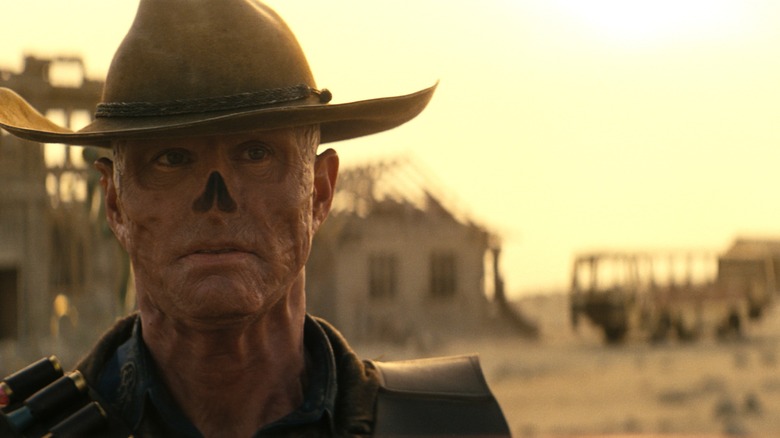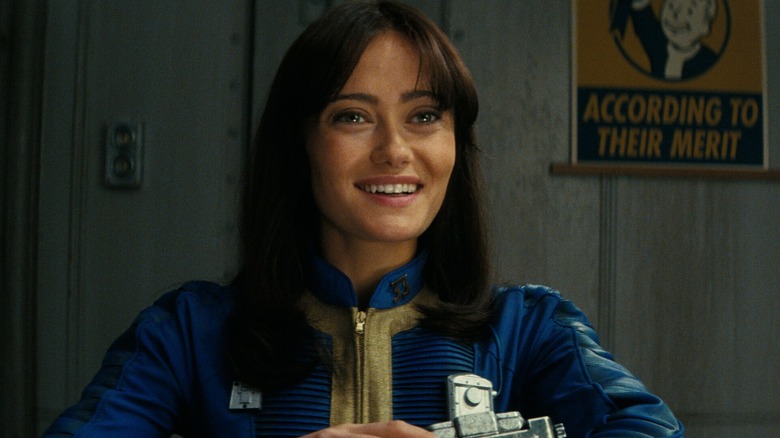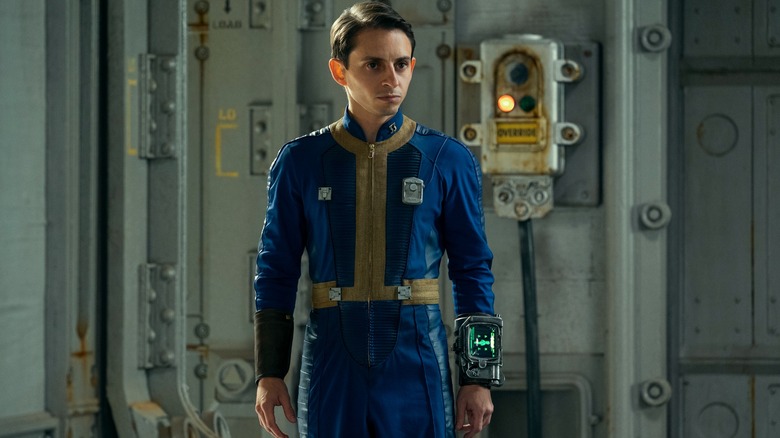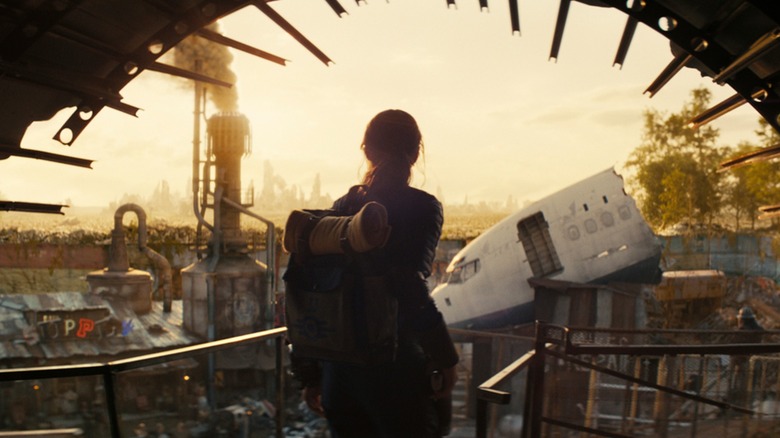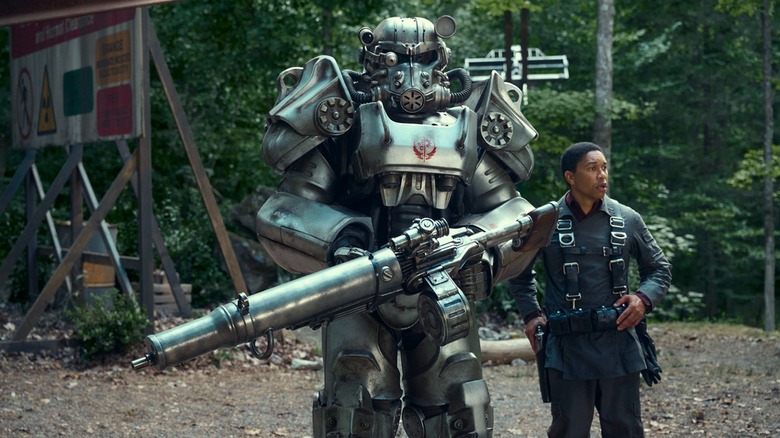Fallout Season 1 Ending Explained: War Never Changes
This post contains spoilers for Prime Video's "Fallout."
The ingenuity of the "Fallout" video games extends beyond their post-apocalyptic worldbuilding and snazzy combat mechanics — they are role-playing experiences that feel intuitive, bizarre, and challenging all at once. To capture these medium-specific idiosyncrasies in a television adaptation of a beloved franchise is a tall order, and Lisa Joy and Jonathan Nolan's "Fallout" understands what it means to inhabit such a broken, retrofuturist society. The end of the first season of "Fallout" is also the beginning, as it promises a new world and sets the stage for chaos and order, with the sway of the pendulum suspended until darker truths emerge. For franchise enthusiasts, it is a familiar story reinvented in meaningful, riveting ways. For newcomers, it is an intriguing post-apocalyptic setting that oscillates between gleeful sarcasm and heartbreaking pathos.
This rendition of "Fallout" puts forth three distinct ideological perspectives that dominate the show's Los Angeles wastelands. Lucy (Ella Purnell), a naive vault dweller with a skewed understanding of the surface, The Ghoul (Walton Goggins), a mutated bounty hunter with a defunct moral compass, and Maximus (Aaron Moten), an eagerly ambitious squire from The Brotherhood of Steel, cross paths while searching for the same thing. The thing in question is a severed head belonging to Wilzig (Michael Emerson), a scientist who escaped from the Enclave and is coveted by every major faction in the area. In typical "Fallout" fashion, plans within plans are revealed, where every faction harbors covert intentions and nothing is what it seems.
Although the lore-heavy video game universe of "Fallout" is vast and boundless, let's dive into the major ideological divides that propel the events in the show, how character motivations evolve, and some of the burning questions that linger after the credits for the season roll.
What to remember about the plot of Fallout so far
The Great War in the "Fallout" universe culminated in nuclear warfare, annihilating the majority of the U.S. population after the surface became contaminated with radioactive fallout. The series gradually establishes the ethos of the Vault Dwellers, the privileged few who were able to afford underground bunkers before everything got razed, and evokes a contrast with the surface dwellers or wastelanders, who managed to survive through other means, perceived by some factions as "barbaric."
After Lucy's marriage ceremony goes horribly wrong, and a mysterious woman named Moldaver (Sarita Choudhury) kidnaps her dad Hank (Kyle MacLachlan), Lucy is forced to defy established rules in search of the truth. Having spent all her life in blissful isolation, where a sense of community is a default sentiment instead of an organically fostered one, Lucy's journey to the surface is rife with uncomfortable wake-up calls about identity and morality. A similar journey is undertaken by Maximus, but his foray into the wasteland feels freeing, as it's an opportunity to escape the hierarchical confines of The Brotherhood and prove his worth. However, with the death of Knight Titus, the former wearer of the T-60 power armor, Maximus gets the chance to reinvent himself and taste true power.
Then there's The Ghoul, whose former life as cowboy actor Cooper Howard feels like a distant dream, as his sense of humanity is altered beyond comprehension by his unnaturally long life. The Ghoul's unrepentant violence clashes with Lucy's credulous belief in traditional morality in Filly and this tension is momentarily diffused by Maximus, who brute forces his way into becoming a heroic, righteous Knight, or at least being perceived as one.
Why is the severed head important to interested parties in Fallout?
Wilzig's story might have been a short one, but the shadow of his posthumous legacy looms large, as something is extremely valuable about his head. Wilzig and his loyal dog become literal targets for everyone, but he willingly entrusts himself to Lucy, having glimpsed the rare nature of her humane tenacity in this hellish landscape. Although Lucy commits several unforgivable acts, she desperately wants to do better for Hank's sake, which is exactly why she puts up with this relentless trial where the reward for logging a head around is seeing her father again. As Moldaver seeks Wilzig's head, Lucy has to ward off every person in pursuit of it until she reaches her destination.
As for The Ghoul, he's a bounty hunter solely interested in money, which can buy him medical serums that suppress the pain and keep him alive for another day. There are no ideological interests here, and his mistreatment of Lucy is a product of sheer vitriol and an insistence to prove that her vault-dwelling sensibilities are laughably hollow, and have no place in such a lawless world. Although he is right about the hypocrisies of Vault-Tec (more on that later), his anything-goes brand of cruelty is extreme and remorseless, shaped by more than 200 years of unimaginable pain and suffering.
Maximus' interest in the head is an extension of The Brotherhood's plans, as it is a mission commissioned by the highest Clerics who wish to fulfill their agendas of saving the world. Pure ambition drives Maximus, who is willing to do anything to climb up the ranks, including impersonating a knight or squashing a squire's foot, but eventually, he dares to dream about escaping an order that is designed to be inescapable.
Fallout's Vault 4 functions as a deliberate subversion of Vault-Tec history
What Lucy and Maximus experience in Vault 4 is designed to subvert audience expectations, especially if one is aware of Vault-Tec's long and depraved history of human experimentation. Ever since the two tumble down the hidden trapdoor, they realize that something feels decidedly off: people seem too happy, a certain floor is off-limits, and some members sport extra or distorted limbs on their faces, hinting at experiments. To make matters worse, Lucy witnesses cult-like adoration for Moldaver and a ritualistic war cry to avenge Shady Sands, which pushes her to visit the restricted area and discover test subjects in pods. However, the logical conclusion she arrives at is a misunderstanding, as Vault 4 is simply trying to rehabilitate test subjects instead of indulging in anything unethical.
Although this encounter is a tongue-in-cheek narrative subversion, Vault-Tec's in-game history of post-war atrocities adds an edge to this incident. For instance, "Fallout: New Vegas" reveals a social experiment in Vault 11, whose inhabitants were asked to select one person as an annual sacrifice, or the entire vault population would die. This tradition was honored out of fear and self-preservation until the numbers dwindled to five, which is when they realized that refusal only meant an automated commendation for "commitment to human life." As there was no real threat to the population at any point, every life lost to the sacrifice could have easily been prevented if only someone was brave enough to refuse.
Circling back to Vault 4, it represents comforts that make survivors morally complacent, luring folks in with caviar, bathrobes, and other luxuries in a world where breathing air on the surface is a liability. Although Vault 4 doesn't make false promises, what about the rest?
What the heck is going on in Vaults 31, 32, and 33?
The mystery surrounding the three connected vaults acts as a microcosmic exploration of the ugly secrets behind the feigned benevolence of Vault-Tec and vault culture as a whole, and the answer to this debacle lies in a decision taken by the company management 219 years ago. Norm (Moisés Arias) is the sole MacLean in Vault 33, and his voice carries more weight than he initially understands, but he decides to silently unravel the secrets of the neighboring vaults. After realizing that Vault 32 underwent an inexplicable "Event Horizon"-esque event, where the vaulters killed one another after scrawling "WE KNOW THE TRUTH" on the walls, Norm decides to figure out why every vault overseer has always hailed from Vault 31.
The truth about Vault 31 is the climax of "Fallout," as it answers every question about the world's end, and how Vault-Tec continues to benefit from this civilization-ending catastrophe. As revealed in the end, there is no Vault 31, as it is essentially a chamber filled with cryo pods of Vault-Tec employees and benefactors waiting to be awoken to foster "a true monopoly" until the surface is wiped clean. This harkens back to the decisive meeting Cooper eavesdropped on 200 years ago, where his wife, a Vault-Tec executive, declared the decision to drop the bomb to execute a hostile takeover that would potentially last decades. It did, as everything is part of a plan to control the Wasteland, where the promise of survival is used to lure people into these cramped, heavily regulated spaces that masquerade as egalitarian meritocracies.
Apart from bombing painstakingly reclaimed urban centers like Shady Sands (spearheaded by Hank, also a Vault-Tec employee), Vault-Tec wishes to permanently eliminate competition: anyone who is not a vault-dweller is an enemy.
Why Cold Fusion is the key to rebuilding the world in Fallout
A chunk of Maximus' trials stems from the need for a fusion core, which helps power his armor, allowing him to protect himself while staying in control. He would have died in the powered-down armor if Lucy had not saved him, and his split-second decision to steal Vault 4's fusion core for his survival underlines his hardened survivalism. Fusion cores are rare luxuries in the Wasteland, typically wielded by vault-dwellers, and the demolition of Shady Sands upended every rehabilitation effort in the last 200 years, making electricity an impossible concept for wastelanders. Enter Cold Fusion, a source of infinite energy that can change the world, lodged into the head of a certain Enclave scientist. Moldaver wants to make this technology available for surface settlements, and she succeeds, but at great personal cost.
This revelation adds clarity to the motivations of every faction who covets this technology, as the one controlling Cold Fusion can "rule" the Wasteland forever. For instance, the Brotherhood's purpose is to regulate the use of post-war technology, and Cold Fusion marks a new era for humanity, propelling the faction to exert control to prevent another apocalypse, as they believe that humans are incapable of peace and stability. Now that Maximus is a Knight, the onus for shaping this new world falls on him, as the Brotherhood has managed to wipe out the survivors in the reclaimed areas, including Moldaver. The only major faction who can squash them is Vault-Tec, who will do anything to render this new tech inaccessible, as a new era would mean that their vaults are no longer the exclusive, coveted safe spaces they wish them to be.
This leaves us with a simple, alarming question: what does the future hold?
What does the ending of Fallout season 1 mean?
After learning the truth about Vault-Tec, Lucy decides to travel with The Ghoul to meet her makers, taking an unshakeable stance against her father. The months spent on the surface have changed her, but Hank's painful betrayal — which makes her realize that her formative values and worldviews are nothing but engineered lies — pushes Lucy to a tipping point. She must fight for the truth, especially now that she knows the extent of the lies that tarnish it, while potentially freeing Norm from forced, undefined stasis in Vault 31. Norm has no choice but to get into his father's cryo pod, which is a painful irony, considering that the MacLean legacy now deeply repulses him.
Hank MacLean, the surprising antagonist of "Fallout," represents Vault-Tec's rot and everything the company has ever done for profits and uncontested market monopoly, including mass murder and bioterrorism. "The future of humanity comes down to management" has become their slogan, and the reality of this scheme is horrifying and haunting to behold, given how a string of cruel acts almost obliterated an entire population and continues to chip away at the essence of humanity. A potential season 2 will most likely grant us more insight into Hank, an enforcer of Vault-Tec's evil who believes his actions are justified — and what is more dangerous than that?
War never changes, so it is unlikely for humanity to curb its destructive, hateful urges, where every faction wants to save the world on its terms, actively dooming it in the process. Like every "Fallout" game, the series underlines humanity's need to cling to absurdist futurism while making the present unbearable, uncaring, and uninhabitable. What remains is the husk of a broken dream for those who dare to embrace it.
